The Huntington Playwriting Fellows
Lisa Timmel, Local Playwrights, and Radical Hospitality
I recently sat down with Lisa Timmel, Director of New Work at the Huntington Theatre Company in Boston, MA, to talk about the concept of Radical Hospitality, new play development, and the Huntington Playwriting Fellows program. How do we stay generous in these awful times?
Melinda Lopez: I wanted to jump in with this question of Radical Hospitality, and how it applies specifically to new play development.
Lisa Timmel: Radical Hospitality is not my idea—it goes back to St. Benedict and the Torah and the thirty-six commandments to welcome the stranger. Mixed Blood Theatre in Minneapolis has embraced this in terms of their audience, and of course Anna Deveare Smith talks about Radical Hospitality in Notes from the Field. Hospitality is an idea that is outward facing: you’re an audience member coming in, and we are going to treat you like a guest, not a commodity.
So I started thinking about this in terms of my audience. The people I am really outward-facing with are artists in a community. So how do I develop work and relationships with artists in a way that embodies the spirit of Radical Hospitality? It's a standard that I fail to live up to most of the time but that's okay, I’m trying.
When Bob Moss founded Playwrights Horizons, he used to say, “Fan every flame.” And when I worked there as Literary Manager and Director of New Play Development, they still accepted unsolicited manuscripts, and there was a process for treating plays that came in, in a way that was mostly humane—we said no to 99.99 percent of the plays, but there was a culture that was meant to be encouraging and open.
That experience shaped a lot of my ethos. Occasionally, a play would come in from a retired professor in Ohio, say, and an intern would do a snarky write-up of these blind submissions, and every year I’d have to sit them down and say, “This script is not just a script. It represents a person and their ideas. And yeah, you’re smart and you’re connected and you’re cool, but think about the courage it took for someone to write a play, pay to print it up—this was when folks were still printing out scripts—put it in an envelope with stamps and letter and self-addressed envelope and put it in the mail and hope someone would respond. It's a really courageous thing to do.” It was really important to me that everyone was always keeping in mind. The impulse is to shut down because there’s just so much to take in. This hospitality or generosity goes hand in hand with understanding what your capabilities are.
In the office here at the Huntington Theatre Company, we are not set up like that literary office—we aren’t set up for unsolicited manuscripts. We could pretend that we could read and process every play that is out there, but we simply don’t have the labor. And we also we have this other notion of community.
Here, we are not “fanning every flame”; there was a deliberate and very important choice made long before I got here to focus on this community of artists—in terms of playwrights—with the founding of the Huntington Playwriting Fellows.
If you’re not prepared to default to ‘yes,’ you are going to default to ‘no.’ The reflexive and self-protective ‘no’ is unhealthy for making art.
Melinda: How do you describe the HPF program? How many alumni are there now?
Lisa: Thirty? Two more this year. A lot.
Melinda: Yeah, for a city the size of Boston, that's a lot.
Lisa: The HPF was conceived as a writers collective that meets twice a month, with support—if they need us to print something, we’ll print it. We try to see all their shows and readings. And they receive a small stipend. They each have a reading in our Breaking Ground New Play Festival and we choose plays at various stages of development to participate in the Summer Play Workshop. We offer in-house table reads any time. If they have something they need to hear, the door is open, and the idea is that they feel at home here.
The original design of the program was four writers together for two years, and then we shifted so that every year, two or three writers join the writers group for two years. The terms are overlapping. One of the thoughts behind that was that it takes about nine months to figure out other peoples’ notes, and at some point you know what their taste is and how they are going to react to your work. So by doing an overlap and having a shifting cohort, you get a fresh eye on your work.
What’s so exciting about having artists in a room together in conversation is that one artist will push you to be bolder, and another one will pull you back from the brink. It makes for wider and more supportive conversations, bringing in in new blood, changing the dynamic.
It also means they have a wider cohort of writers in Boston. I think almost all of the HPF’s have continued to have some sort of artistic relationship with the people in their group. David Valdes Greenwood is in communication with Eleanor Burgess. Lila Rose Kaplan and Walt McGough often get together and read plays together. A lot of HPF Playwrights participate in other new play programs too.
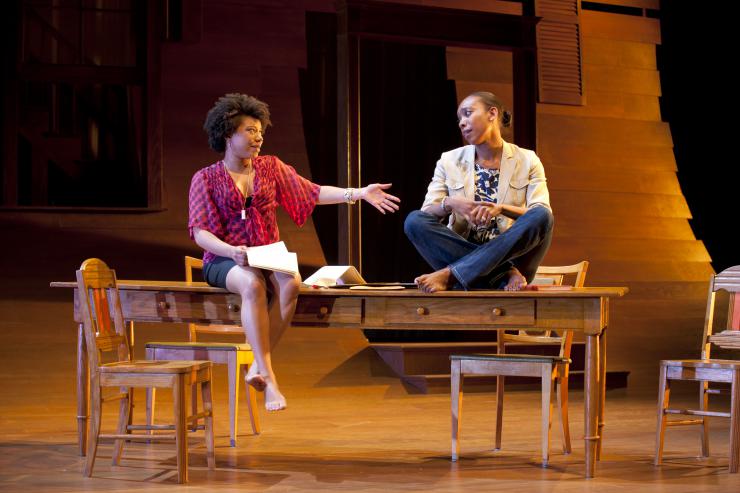
Melinda: Often writers will find a community on their own because they are like-minded or saw each other’s work, but having a system in place that encourages and nurtures that, and even puts different kinds of writers together is unusual. And there’s a longer relationship. As an alum, the thing I find striking is how long those relationships last.
Getting back to this idea of Radical Hospitality—How do you create that within your artistic community?
Lisa: I don’t interact with the subscribers or the donors or the Board very often. I work most closely with the artists. It’s about investing in the artists right in this area—we have taken writers from Northampton, New Hampshire, Providence, the Cape…
Eight years ago, there weren’t that many companies producing new work by Boston-based writers. But now we have Fresh Ink, and New Rep has expanded their work with Boston writers. SpeakEasy produced Johnny Kuntz’ play Necessary Monsters. And there are certainly a lot more writers groups. So it feels like there is more opening up, and more opportunities for people outside of the Huntington, which is great.
Melinda: It feels like it has empowered playwrights.
Lisa: Definitely! In fact, the idea for and structure of the Summer Workshop came out of a big meeting with all the HPF alumni. We said, “What do you need?” And this is what came out of it: A workshop to develop and work on a new plays. Actors. A director. Dramaturgy. A staged reading. Two weeks with time to write. Then a smaller group sat down and worked with us and helped tease out what it would look like and how to choose the projects. The summer workshops are only open to HPF alumni, and Playwriting Fellows who are not applying for the summer workshop sit on the panel and help choose the plays for that year. So it ends up being a way to both help each other, and help the company, and that's been one of my favorite things.
I wonder if at this time when culturally, at large, many of us feel embattled, and under pressure and starting to worry—how will we maintain the ability to…stay generous?
Melinda: Why are you good at your job?
Lisa: I haven’t the foggiest fucking clue. I think I’m effective. That's a really hard question. Many days I don't feel good at my job. Because art is hard. And when you’re the person on the outside of the act of creation, all you can do is to listen—and listen a lot more than you are talking.
The thing that underpins Radical Hospitality for me is the notion of generosity. You have to be generous with people and understand that it’s your job to make room for them to create their work. It’s not your job to push a play in line with a certain style or aesthetic.
Come into my home. You are allowed to be who you are in my home.
What tends to happen is we take a lot of ownership of our institutions, and think, “I’m going to be here tomorrow but the visiting artist is not.” So the temptation is, “I’m going to protect me and my own, and if there is a conflict, or of I have an aesthetic disagreement with the artist, I have this big institution backing me up.”
Or what happens more often to a dramaturg is that you are in between the artist and the institution, and you can forget that they are a guest in your home. And you act out of fear instead of generosity.
Melinda: Yeah, that's in the air.
Lisa: Take, for example, the psychology of the President saying, “We are going to get rid of the NEA.” The psychology is really hard to run away from and is actually more powerful than losing the grants we get from the NEA because it says the country doesn’t value the art. And it’s easy to panic. I think we all have very small versions of that happening to us all the time. When it comes time to actually make the play, make the choice, make the budget, cut the budget, it can be hard to put the artist first.

production by an HPF. Photo by T. Charles Erickson.
Melinda: What do you love to see onstage?
Lisa: There’s almost nothing I won’t go see. With the exceptions of maybe one more serious production by Arthur Miller.
I will say that I have never been interested in stories about people who look like me or think like me or live like me. I got into theatre because at the time that I started out, I was seeing a lot of material that I didn’t understand, and that was very far away from my sheltered existence as a young person in Ohio. My first internship was at the Actors Theatre of Louisville, and that year at Humana there was Jose Rivera’s Marisol, Suzan-Lori Parks’ Devotees in the Garden of Love, David Henry Hwang Bondage, and Oskar Eustis showed up with a copy of Millennium Approaches and the first draft of Perestroika.
I remember I was having a conversation with a colleague about one of the Humana plays, and she was like, “I don't get that play,” and I said, “I don't get it either. But that’s why I want to work on it.” The motivating factor has always been about the things I don't understand.
This is why the notion of Radical Hospitality appeals to me. Because if you are open to all comers, you’re going to find the thing you don't know, and have a chance to learn and grow. Maybe you'll have an experience and maybe you won’t, but you know you won’t learn and grow from plays that—however inadvertently—just reinforce the status quo and make you think you’re a good person even though you don't actually have to lift a finger to change the world or your circumstance.
If you don't throw your doors open as widely as possible—and I’m not saying the doors at the Huntington have been opened terribly widely, but they are opened as widely as I can open them—you’re going to find somebody that you didn't know was there.
Hospitality and generosity are also fundamentally about seeing the artist in front of you and accepting them. They’re going to want to work differently from how your company works, and that's not an insult to how your company works. And they are going to want things that you weren’t prepared to give them at first ask. If you’re not prepared to default to “yes,” you are going to default to “no.” The reflexive and self-protective “no” is unhealthy for making art.
But if the notion of hospitality does not extend past the literary office, it’s not doing a lot of good. That said, I think it’s important to try to lead by example. If I’m cranky and bitching about “oh these writers, they want so much…” then that empowers people who are less sold on the idea of doing new work to dispute the necessity of it.
And I wonder if at this time when culturally, at large, many of us feel embattled, and under pressure and starting to worry—how will we maintain the ability to keep taking it in and to stay generous? We all feel so besieged, and I wonder how things are going to go over the next couple of years.
Melinda: How do we keep gravitating towards those challenging plays that we don't understand when there is so much going on that we don't understand?
Lisa: Do we need some stories that tell us that we can win the battle? “You’re going to wander forty years in the desert, but one day you will reach the Promised Land. You are going to get there.”

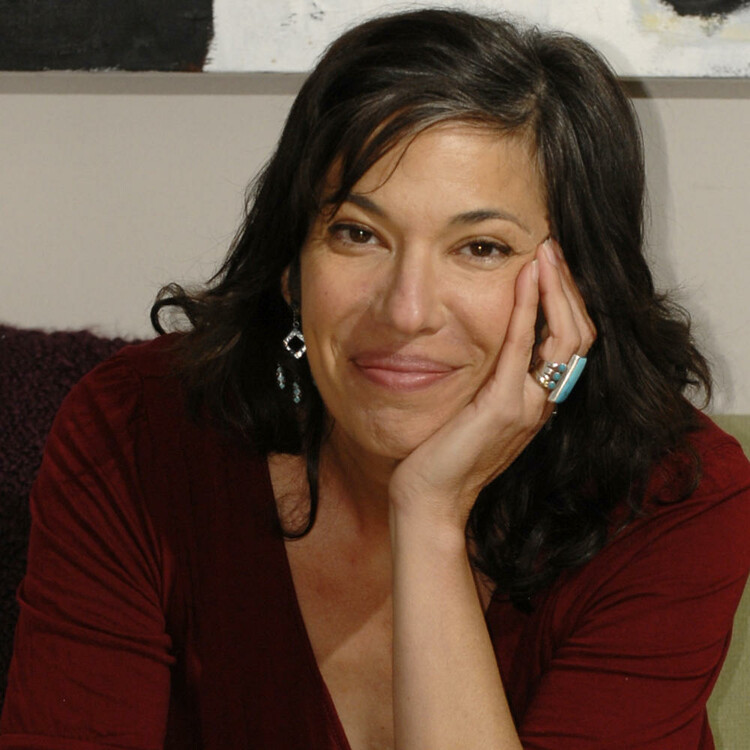
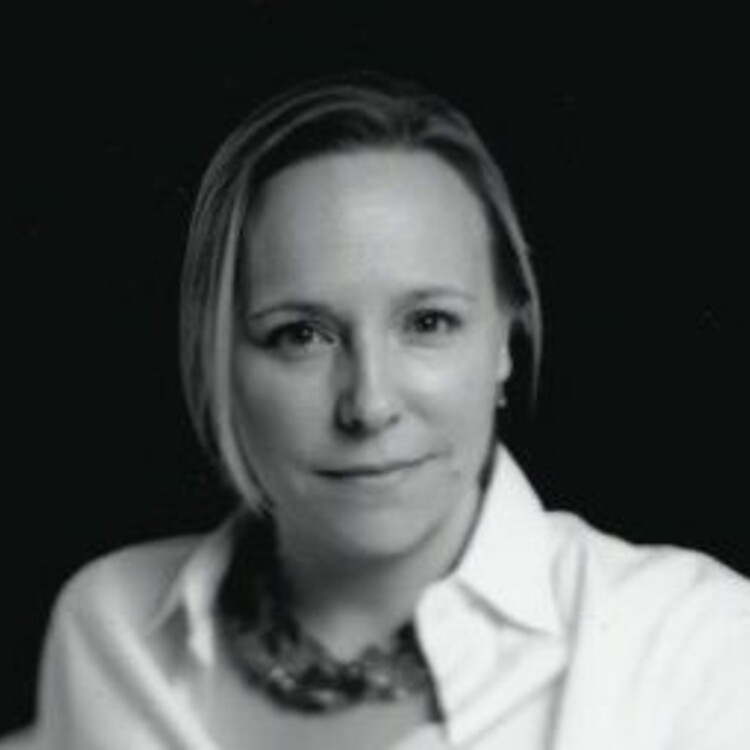
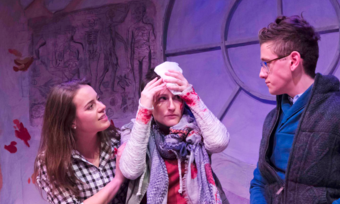


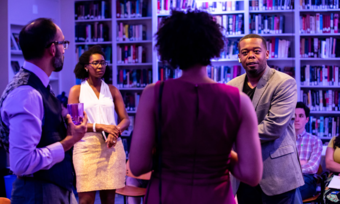


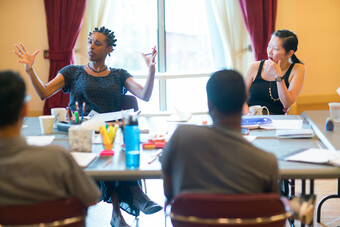

Comments
The article is just the start of the conversation—we want to know what you think about this subject, too! HowlRound is a space for knowledge-sharing, and we welcome spirited, thoughtful, and on-topic dialogue. Find our full comments policy here